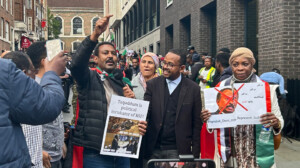Sudanese imam calls on ‘supporters of the Sharia’ to resort to reason
On Friday, the imam leading the prayers at the sit-in in front of the General Command of the Sudanese army in Khartoum pointed to the values of justice and equality in Islamic law (Sharia).
Imam Nasreldin Mufarih, responsible for the sermon at the sit-in on Friday, condemned the attacks on peaceful protesters at the sit-in on Monday and Wednesday, and called on the Transitional Military Council to prosecute the attackers.
 Sudanese protesters perform Friday prayers near the General Command of the army in Khartoum, April 2019 (CGTN)
Sudanese protesters perform Friday prayers near the General Command of the army in Khartoum, April 2019 (CGTN)
On Friday, the imam leading the prayers at the sit-in in front of the General Command of the Sudanese army in Khartoum pointed to the values of justice and equality in Islamic law (Sharia).
Imam Nasreldin Mufarih, responsible for the sermon at the sit-in on Friday, condemned the attacks on peaceful protesters at the sit-in on Monday and Wednesday, and called on the Transitional Military Council to prosecute the persons responsibe for the violence.
On Monday and Wednesday, members of an unknown militia, said to be paramilitaries of the Rapid Support Forces (RSF), violently attempted to dismantle the barricades placed by the protesters to protect the sit-in area.
The imam appealed on the people at the sit-in “to keep the peacefulness of the revolution in order to reach justice and equality”, and called for “respect for the armed forces as they are partner in the process of change and eradication of the former regime”.
He said that he considers the Alliance of Freedom and Change, “with 200 departments in the country, as the representatives of the will of all Sudanese”.
Values
Mufarih called “with all due respect” on “those who claim to support the Sharia, to resort to reason by taking refuge in Allah.
“The support for the Islamic law is not achieved by mobilising people, but rather by committing to the values of justice and equality,” he said.
He wondered where “these supporters of the Sharia were when the former regime killed people in South Sudan, Darfur, Blue Nile and South Kordofan, and now, when peaceful protesters are killed”.
He also criticised their silence about on usury loans approved under the former regime, headed by President Omar Al Bashir, who was ousted on 11 April.
Our editorial independence means that we can continue to provide factual updates about ongoing protests to Sudanese and international actors, educate people about how to avoid outbreaks of infectious diseases, and provide a window to the world for those in all corners of Sudan. Support Radio Dabanga for as little as €2.50, the equivalent of a cup of coffee.












 and then
and then